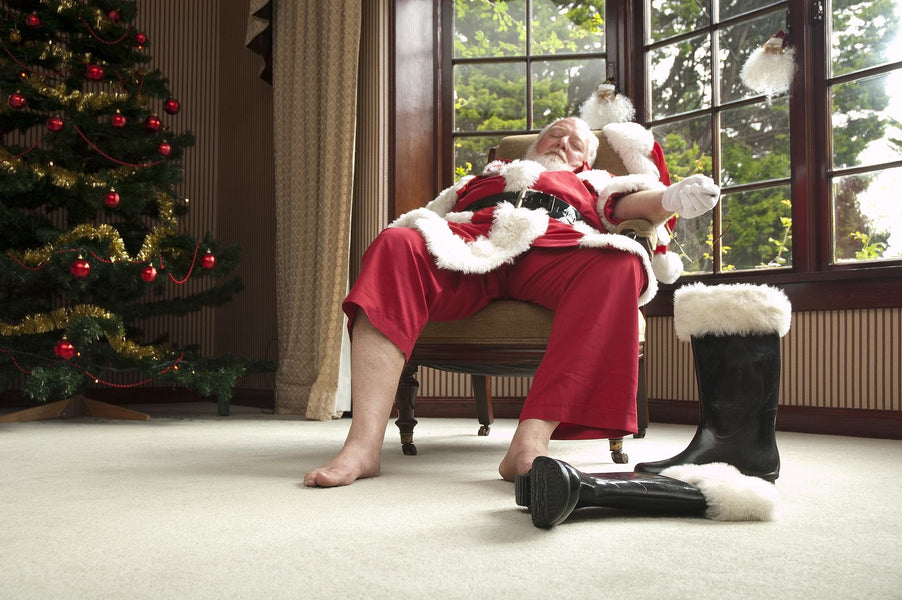
This time last year I had an endless loop of names buzzing around in my head. Everyone from my husband and kids, to my parents and in-laws, to my siblings and their kids, to our extended family and friends, my son’s childcare teachers, neighbours, colleagues, employees, and even the cleaners. For each name on the list, I was wracking my mind trying to come up with a meaningful holiday gift.
I appreciated these people. I wanted to give them something to say “thanks for a great year,” “I hope you have a happy holiday,” and “I wish you well for the year ahead.” But when the 1st of December rolled around, a sense of dread rose inside me. The thought of shopping mall parking battles, late-night gift wrapping marathons, melting credit cards, and uncomfortable exchanges with people who might give me a gift that I hadn’t reciprocated made me feel anything but cheerful.
When did the holiday gift-giving tradition become so stressful?
It wasn’t always like this. I used to get a warm glow when I finally thought of the perfect gift for someone I love. I used to take great pleasure in seeing their delight in opening it.
There’s a ton of interesting research looking at this warm fuzzy feeling we get when we give someone a gift. For example, leading happiness researcher, Elizabeth Dunn from the University of British Columbia and her colleagues have demonstrated that when they told people to spend either $5 or $20 on someone else, they felt happier than people assigned to spend the money on themselves. Interestingly, the amount of money they spent made no difference to their happiness. It was the act of giving, no matter how much was spent, that made them feel good.
This is not limited to Western countries either. When Dunn and her colleagues used survey data from 136 countries they found that “prosocial spending” is associated with greater happiness around the world – in poor and rich countries alike. This suggests that our capacity to derive joy from giving might be a universal feature of human psychology.
When you think about this, it makes sense. The great evolutionary thinker Charles Darwin, who is noted for his theories about the survival of the fittest, actually also wrote about the survival of the kindest. “Those communities, which included the greatest number of the most sympathetic members, would flourish best, and rear the greatest number of offspring,” he wrote in his book The Descent of Man in 1871.
As a health journalist, with a vested interest in finding new ways of keeping my health on track, I was fascinated to come across Dunn’s latest study which found that spending money on others is good for our health too, specifically, heart health. Dunn found that the more people reported spending on others, the lower their blood pressure was two years later. She also showed that when people were assigned to spend money on others for three consecutive weeks, they had lower systolic and diastolic blood pressure compared to people who were assigned to spend money on themselves.
These health benefits don’t just come from financial gifts either. People who give the gift of their time four hours a week are 40 percent less likely to develop heart disease. People suffering from chronic pain experience decreased pain intensity when they serve as peer volunteers for others suffering from chronic pain. In fact, research consistently links the act of donating your time to lower all-cause mortality. In one study, people who are 55 years and older who volunteered for two or more organisations were found to be 44 percent less likely to die.
And yet, for all this wonderful healthy potential for gift giving, as I wrote in my blog post “Are Holidays Bad for Our Health?” it often seems the “silly season” is now focussed on materialism where we eat too much, drink too much, and buy too much, and we are left feeling exhausted, empty, and poor.
This year I decided to do things differently. Instead of worrying about finding gifts that won’t cost too much time or money, I’m taking a “more joy, less stress” approach. So far, I’ve done the following things:
- Think outside the mall – I’ve done the majority of my shopping online and managed to so far avoid the chaos and crowds.
- Buy early – this has helped to spread the cost of the season over the whole year and takes the sting off the credit card.
- Buy experiences – research shows that experiences bring people more happiness than do possessions.
- More meaning, less crap – For the extended Harvey family, we’re doing “family presents.” We’ve pulled one family out of a hat and have to come up with just one gift for that one family.
- Gifts that people want – If I’m stumped, I’ve asked people’s partner or close friend if they have anything in mind that their loved one would like.
- Gifts that give twice – I’ve found some wonderful organisations that sell things in order to give back. Check our the Oxfam Shop or these silk knotted beads from my friends at the Posibility Project for some examples.
I’d love to know what you’re doing to take the stress out of holiday gift-giving in the comments below.





 The Connection (DOWNLOAD-TO-OWN)
The Connection (DOWNLOAD-TO-OWN) My Year Of Living Mindfully - Book
My Year Of Living Mindfully - Book




